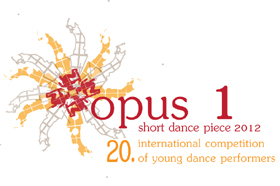|
Prireditve

OPUS 1 – PLESNA MINIATURA 2012
OPUS 1 – SHORT DANCE PIECE 2012
Celje, 9. junij 2012 / 9 June 2012
Topic: Literature and Dance
A short guideline for mentors and young performers /creators
The aim of OPUS 1 – SHORT DANCE PIECE is not to push for competitiveness, but to foster creativity of young performers.
The annual topics are meant to stimulate critical thinking about specific issues within young performers and give them the means to learn about, research and study specific topics and dancers/artists.
The incentives to create a dance piece are varied. This year’s topic wants to nurture the ties between the meaning(s) of language and the “meaningfulness” of dance. How can the contents which have been finalised in a writer’s head and were then transformed into letters, words, sentences and sequences be translated into dance, put on the stage, transmogrified into a different medium?
You should approach this year’s topic by selecting a literary piece, either poetry or prose. We suggest you choose from among your country's writers from the 20th and 21st century.
There are countless creative ways and procedures that allow you to translate one medium into another. Find your own way!
The obligatory part of the creative process should also be translating your ideas and procedures into words. The same as every year, you have to attach a description of your creative process to your application (literary origins, thoughts, procedures, decisions…). Think about it and work on it so as to genuinely delve into the depths of your short dance piece.
Mentors should discuss the topic with the young performers, while the latter should be autonomous and creative in shaping their ideas and pieces.
Mentors should also spend more time with younger dancers in order to bring the topic closer to them on a level that they can understand.
The most important part of OPUS is the process of shaping the idea and creating the short dance piece – the process of learning and self-development. Young performers should draw on their existing self-confidence in themselves and their ideas or acquire it.
The role of the mentor in creating the short dance piece is to counsel, lead and guide the child/young performers in creating their own ideas, dance expressions and autonomous choreographies.
|